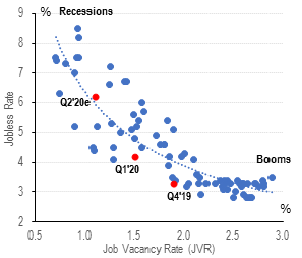 Global| Sep 18 2020
Global| Sep 18 2020Hong Kong Unemployment (August 2020): Labor Market Remains Feeble in the Short Run
Summary
On a seasonally adjusted basis, the unemployment rate was unchanged at 6.1% in the three months to September, according to the Hong Kong Census and Statistics (see Figure 1). Note that the jobless rate has been hovering around this [...]
On a seasonally adjusted basis, the unemployment rate was unchanged at 6.1% in the three months to September, according to the Hong Kong Census and Statistics (see Figure 1). Note that the jobless rate has been hovering around this level since May this year, showing tentative signs of stabilization despite the city’s battle with the third wave of Covid infections. The time also coincides with the implementation of the Employment Support Scheme (ESS)- the government’s anti-pandemic measure supporting the ailing economy, suggesting that the initiative might have impacted the Labor market positively on the surface, putting a lid on the unemployment rate. Figure 2 shows that the cumulative change in jobless rate for the current cycle has plateaued somewhat.
Figure 1: The rapid deterioration in the labor market Figure 2: Cumulative change in the unemployment rate by recession
Source: Censtatd, Haver Analytics Source: Censtatd, Haver Analytics
Figure 3: The Beveridge curve suggests the economy is now in recession
Having said that, the number of unemployed is still at its highest level since the SARS outbreak in 2003. At 248k, it has doubled in the last 8 months since the pandemic began. More conspicuously, the underemployment rate surged almost fourfold over the same period to the highest level since 2003 (3.9% sa), exposing broad weakness in the economy. Indeed, Figure 3 shows the dire state of the Labor market, suggesting the local economy is in recession.
Digging beneath the surface, the breakdown shows that construction and retail, accommodation and food services remain the hardest hit industries by the pandemic. Their unemployment rates were amongst the highest at 11.1% and 10.9% respectively, while their underemployment rates stood at 8.1% and 5.9% respectively. The weakness in retail, accommodation and food services is unsurprising given their heavily China-reliant nature heightened by recent stringent social distancing rules and travel restrictions.
All in all, there has been heated debates over efficiency of the ESS scheme at a macro level because the government effectively sprayed money indiscriminately across the entire economy but not targeting industries and individuals most in need, the scheme nevertheless eased the rate of deterioration in the Labor market somewhat. However, with no end to the pandemic in sight, the local economy is unlikely to recover anytime soon. Elsewhere, the financial secretary has recently pushed for the implementation of the “health code” in the city (a QR code given to individuals tested negative for Covid-19), its primary purpose is to facilitate quarantine-free travel between the mainland and Hong Kong, in the hope to revive cross-border economic activities. While this may boost growth temporarily, the policy is likely to increase the risk of the fourth wave due to more lenient border measures, potentially disrupting local activity once again because of resumption of anti-pandemic measures. Looking ahead, weak Labor market condition witnessed in Q3 is likely to persist in the near future, reflecting the faltering economy. We believe a solid recovery only ensues when economic uncertainty recedes and a vaccine is widely available.
Viewpoint commentaries are the opinions of the author and do not reflect the views of Haver Analytics.Kelvin Ho-Por Lam
AuthorMore in Author Profile »Kelvin Ho-Por Lam is a former Greater China economist with HSBC Global Markets. Before joining HSBC, he was a member of the Asia economics team at Citigroup Global Markets in Hong Kong. Prior to his return to Hong Kong in 2015, he was a UK economist at Santander in London and a property economist at MSCI Inc. In 2019, Mr. Lam was elected as a Hong Kong district councillor for the Southern district. Kelvin graduated from the University of Southampton in 2001 where he studied economics and finance. He also holds an MSc degree in economics from the University of York and an MSc in management from the London School of Economics and Political Science.
More Economy in Brief
 Global| Feb 05 2026
Global| Feb 05 2026Charts of the Week: Balanced Policy, Resilient Data and AI Narratives
by:Andrew Cates









